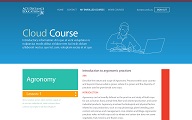
Deliver High Quality Seminars and Classes via Distance Learning
Distance education is a rapidly growing learning model. With people returning to study to upskill or transition into new careers, flexible, life-adaptable learning is in demand. In this course, you'll learn about delivering material via distance methods, including online and e-learning. Study learning and teaching types, such as behaviour and adaptation models, and how to provide resources and support for flexible learning. Useful for:
- consultants
- trainers
- non-traditional teachers, such as EAL/D, ESL, and EFL
- seminar leaders
Duration: 100 hours
Course Content and Structure
There are 9 lessons in this course:
- Scope and Nature of Distance Education
- Trends in Education
- Changes in the World and their Impact on Distance Education
- Growth in the Distance Education Industry
- Advantages and Disadvantages of Distance Education
- Forms of Distance Education
- Traditional Distance Education (paper-based education)
- Mentor guided projects or research
- Video or audio courses
- Real Time Conferencing
- Online
- E Learning
- Blended learning
- What Style of Study Works Best
- Adapting Teacher-Learning Models to Distance Education
- Exposition Model
- Behavioural Model
- Cognitive Development Model
- Interaction Model
- Transaction Model
- Comparing Online Education with Traditional Distance Education
- Getting the Student Started
- Profiling Students who are New to Distance Education
- Making the Transition
- Getting Past the First Lesson
- How to Do Assignments
- Time Management
- Writing Style
- Completing Assignments
- Supporting Students
- Introduction to Nature and Benefits of Support Services in Distance Education
- Types of Support Services
- Guidelines for Counselling New or Prospective Students
- Guidelines for Completing Assignments
- Help with Research
-
- Real Time Support
- Introduction
- Dealing with Practical Work
- Telephone Conference
- Online Chat
- Video Conferencing
- Mentoring
- Workshops and Attended Events
- >Conducting Structured Exercises in Small Groups
- Listening Skills
- Empathic Listening
- Conflict
- Managing Resources
- Scope of Resources
- Cost of Resourcing
- Considering Resourcing Options
- PBL Project to manage resources for a specified distance education course.
- Assessment
- Introduction
- Various Approaches to Assessment
- Grading
- Types of Assessment for Distance Education
- Submitting and Processing Assignments
- Marking Exams
- Exam Procedures and Processes
- Plagiarism
- Practical Examination
- Student Administration
- Introduction
- Advice for Prospective Students
- Enrolment Procedures
- Student Records
- Managing Feedback and Course Improvement
- Communication Skills
- Introduction
- Interpersonal Communication Skills for Distance Education
- Classroom Education does not Suit Everyone
- Understanding What Impairs a Student's Focus
- Supporting Graduates
- Cost Vs. Benefit
- >Alumni
- Direct Support
- Assistance with C.V.s
- Networking Services
- Career Advice
- Ongoing Use of Student Services
- News Bulletins
Each lesson culminates in an assignment which is submitted to the school, marked by the school's tutors and returned to you with any relevant suggestions, comments, and if necessary, extra reading.
Course Aims
- Identify differences between various modes of distance education and other forms of education.
- Determine appropriate methods for communicating with, and motivating action from, new distance education students.
- Provide effective support services to students undertaking distance education studies.
- Explain the ways that teachers and students can work together by using effective listening skills, problem solving techniques, empathy and other interactive strategies to maintain effective and meaningful relationships in the learning process.
- Manage physical and human resources within a distance education program to achieve appropriate benefit for cost expended.
- Conduct effective assessment of distance education students.
- Conduct effective administration of distance education students.
- Improve students’ and teachers’ ability to communicate effectively in a distance education environment.
- Provide support for graduates upon or following completion of a distance education course.
WHAT YOU WILL DO IN THIS COURSE
- Investigate the scope and nature of distance education being used in your country, both by: a/ Government Education Services and b/ Private enterprise
- Describe which method of distance education you think is most appropriate for specified skills
- Interview students from the same course or a course in the same field to find what motivates them to complete the course.
- Give an example of a positive and a negative incentive in an educational setting.
- Give an example of where a negative incentive may be appropriate and explain why.
- List three (3) practical ways a teacher might develop inquisitiveness or curiosity among students
- Explain how your approach might be different when trying to motivate a perfectionist or high achiever compared to motivating a person with low self esteem or lack of enthusiasm
- Investigate 2 other distance educations schools and compare support services in each.
- Explain how you could increase the capacity of the learning experience to cater to varied individual needs among D.E. students studying on line courses
- Observe and record listening behaviour
- Describe what applications you think chat has for distance education
- Outline training needed before using a new tutor (with only classroom teaching experience) as a distance education tutor, who needs to communicate with D.E. students using a variety of different communication methods
The Student Must Be Involved!
 Whatever the type of education, whether online, classroom based, distance learning, book learning, video learning, or anything else, learning works best when students participate. This can be easier for some students than others. For example, some students may find it easy to go and ask a teacher a question, some may find it easy to put up their hand in class, some may find it easier to email a distance learning tutor and ask a question.
Whatever the type of education, whether online, classroom based, distance learning, book learning, video learning, or anything else, learning works best when students participate. This can be easier for some students than others. For example, some students may find it easy to go and ask a teacher a question, some may find it easy to put up their hand in class, some may find it easier to email a distance learning tutor and ask a question.
“Tell me and I forget, teach me and I may remember, involve me and I learn.”Benjamin Franklin
“A wise man can learn more from a foolish question than a fool can learn from a wise answer.”
Bruce Lee
Some students are shy, others lack motivation. They may find it hard to ask a tutor a question. Distance education works best though when there is interaction between tutor and student; and in some respects, that can be easier in a distance course than a classroom course.
- With distance education, students may have the full attention of their tutor when they ask a question
- In a classroom, a student must compete with others in the class.
All students should be encouraged to ask and learn, just as much when studying by distance education or online. We learn by gaining information. This can be through reading, writing, observation and also by asking others. We all have different learning styles to and once you have found yours, whether you are someone who learns more by seeing by listening or by hands on practical work it makes study and learning a whole lot easier.
The most effective learning tool for the student, in any learning situation is to ask questions. Consider:
- Your learning is your own responsibility, you have a choice, what you choose to do and how well you do it.
- The more you ask questions, the easier it becomes to ask questions
- Good direct questions should give good thorough answers
- You are perfectly entitled to say “I do not understand”; and if you remain confused after being answered; you are equally entitled to say “I still do not understand”.
- If a student finds it difficult to ask; they could start by asking questions before or after class; or writing a question down.
Teaching staff should encourage students to ask questions; foster participation by all; and be aware and sensitive to those who do not naturally participate in asking questions. If you find it personally difficult to ask questions, be aware of this then and work on conditioning yourself to ask more questions to foster more complete better learning.

WHAT NEXT?
Register to Study -Go to panel toward top of this page (right column)
or
Get Advice -Use our FREE COUNSELLING SERVICE to contact a tutor
CLICK TO CONTACT US